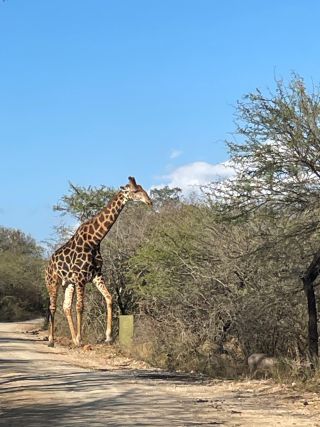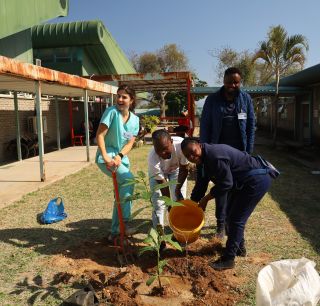Career
Volunteering: A Personal Account of Challenges and Change
A Personal Perspective: Volunteering makes a difference.
Posted July 30, 2023 Reviewed by Abigail Fagan
Key points
- Medical volunteering addresses rural healthcare challenges while supporting local systems.
- Benefits of volunteering include cross-cultural experiences, personal growth, and networking.
- Volunteering can expose poverty's impact and inspire advocacy for equitable healthcare.
Last night, I sat around a fire at the Tshemba Lodge situated in the Moditlo Game Reserve in the province of Mpumalanga, South Africa. The medical volunteers had returned from their work at the rural hospital and surrounding community clinics.
I began by sharing a WhatsApp message that a leopard had been sighted at a water hole, a mere 20 meters or so from where we were sitting, and advice to be careful. There are no fences or barriers within the reserve.
A fellow volunteer, Kobus (a fictional name), a gynecologist and obstetrician, had just spent his first day at the hospital.
Kobus related that he oversaw the birth of twins, with the second twin becoming “stuck”. He reflected on what may have occurred had he not been at the hospital, which is largely staffed by community service doctors, who are required to provide one year of community service in South Africa following their two-year internship following graduation from medical school.
I asked about his motivation for leaving a busy practice in Cape Town to volunteer through the Tshemba Foundation. He reflected that he had also been a junior doctor, and understood the stressors involved in delivering health services in rural and often under-resourced rural and remote areas. If he were able to contribute to the development of medical knowledge and procedural skills of young doctors, he would be extending his expertise to a large cohort of people
I wish to share something of my experience and early learnings on the “rewards” of volunteering.
Some background
The Tshemba Foundation is based in Mpumalanga in the eastern part of South Africa, bordering Swaziland, Mozambique, and the Kruger National Park. The name, Mpumalanga means “the place where the sun rises”. It is a physically beautiful part of the country with hills and grasslands. The population is a little over 4 million people.
Poverty has been endemic with an average annual family income of about $1,600 pa. There are high rates of malnutrition, infectious diseases, and limited access to healthcare due to the tyranny of distance, lack of transport, and financial constraints. The health burden is further compounded by communicable diseases, including HIV/AIDS (over 750,000 people) and tuberculosis (TB), as well as an increasing incidence of non-communicable diseases like diabetes and hypertension. Similarly, the burden imposed by mental health is reportedly complicated by significant adversity in the community, including high rates of gender-based violence, conservatively estimated as affecting one in three women (Wanjiru, 2021).
As a point of comparison, the province has 33 general medical practitioners per 100,000 population, while countries such as Australia have 420 FTE (full time equivalents) medical practitioners per 100,000 population. These health challenges place immense strain on the limited medical resources available which in turn require innovative responses.
Tshemba Foundation is a non-profit organisation, founded in 2014 by an ex-South African philanthropist, Neil Tabatznik. The initial impetus of the foundation was to improve access to healthcare in a significantly under-resourced rural community. As part of this initiative, Prof. John Gear, a Professor of Public Health from the University of Witwatersrand, took on the role of medical director.
The Tshemba Foundation's mission is to improve access to quality healthcare for disadvantaged communities in rural South Africa. Their vision is to create sustainable healthcare solutions by mobilizing medical volunteers and building capacity within local healthcare systems. The foundation offers medical volunteer opportunities for healthcare professionals, including doctors, nurses, allied health professionals, and medical students.
My journey, as an academic and clinical psychologist, began some nine months prior to my arrival, by means of a Zoom interview with Prof. John Gear, Lisa Dickens, who oversees the volunteer program, Dr. Belinda McIntosh and colleagues. No doubt, there were questions as to how a clinical psychologist, who no longer held professional registration in South Africa, and did not speak the local language, would be able to contribute to the work of the hospital.
I have seen my role as evolving and found a niche in supporting staff dealing with a range of demands, in a context where resources are limited and very different to the cities in which they trained.
There are currently seven volunteers staying at the Tshemba Lodge — two obstetricians, one from the Netherlands and the other from Cape Town, a general practitioner from Ireland, two medical practitioners from the United Kingdom and one from South Africa, and an anesthetist from the United Kingdom. Volunteer medical staff attend to patients, contribute to the professional development of health staff, engage in critical discussions around health service delivery, and give input to the development of health protocols and programs.
In return, volunteers are accommodated in “upmarket accommodation” within the Moditlo Reserve which is close to some of the most spectacular game reserves in the world, and abundant scenic beauty, such as the Blyde River Canyon!
Potential Benefits of Volunteering
1. Revisiting the rationale for our professional lives
The hospital, with all the limitations of a rural hospital, deals with patients and communities with multiple and complex health needs. While most hospital staff are driven by a desire to make a difference, facilities are limited. For example, at this time, air-conditioning in theatres does not always work, the supply of oxygen may be interrupted and there may be times when there is no running water. The hospital's commitment to compassionate care and its efforts to improve the health outcomes of an underserved population make it a fitting setting for medical volunteers seeking to make a difference.

2. Making a Positive Impact
The challenges seemed immense, yet I also appreciated the impact medical volunteering, together with the services provided by permanent staff, can have on the lives of an underserved population. Witnessing the response of patients was affirming and testimony to the efforts of staff.
A recent English graduate with five years’ experience from London described her need, as a doctor to “balance public good versus self-interest,” adding, “I feel it’s a lot more rewarding to see people where I can actually make a small change and it makes a big difference to their lives. I think I value a job [which is] rewarding rather than the money”. —Volunteer J, used with permission.
3. Embracing Cross-Cultural Experience
The experience, based in rural Mpumalanga provided us with an authentic cross-cultural experience. Understanding local customs and languages (we all learned to say "Abusheen" pretty quickly) allowed us to build deeper connections with patients and colleagues alike. This cross-cultural immersion nurtured empathy and expanded our perspective on global health issues more effectively than any number of academic seminars or workshops.

4. Personal Growth and Empathy
The relationships formed as part of one’s participation, and through the myriad and often unplanned social activities provides a supportive microcosm for reflecting upon our strengths and also our relationships with others.
“I don't think I'm very confident as a doctor so it's kind of made me believe in myself a bit more and the fact that people have said I've been really helpful which I think is giving me a lot of confidence … as a doctor.” —Volunteer R, used with permission.
The environment, bush and wild animals provide a metaphor for also being in touch with our own more primitive needs for connection and vulnerabilities and sense of inter-dependence that transcended borders and cultural barriers.
5. Collaboration and Networking
Working together with local and international colleagues fostered a supportive network of like-minded individuals committed to global health equity. I predict that the connections forged “in the lodge” are going to be more long-standing than people may appreciate at the time, open doors to future career opportunities and facilitate the exchange of knowledge and best practices.
6. Skill Development
Facing challenges enables us to grow beyond our current clinical skills and develop new competencies.
“I saw a 40 yo man on the TB ward with advanced HIV [and another] with PCP, a horrible fungal lung infection so we started him on treatment, and it cleared completely.” —Volunteer R, referring to presentations she had not seen previously having worked in London.
Effective communication, adaptability, teamwork, and problem-solving are required.
Conclusion
My volunteering experience has been a journey of compassion and humility. Working within a rural hospital context exposed me to the stark realities of poverty and limited medical resources faced by underserved communities. Despite the challenges, I witnessed the dedication of the local community and the dedication of healthcare professionals. This experience has been formative, inspiring a commitment to advocate for sustainable change and work towards a future where every individual can access quality healthcare, regardless of their circumstances.
References
Wanjiru, Q. (2021). Causes and Effects of Gender-based Violence: A Critical Literature Review. Journal of Gender Related Studies, 2(1), 43-53. https://doi.org/10.47941/jgrs.742




